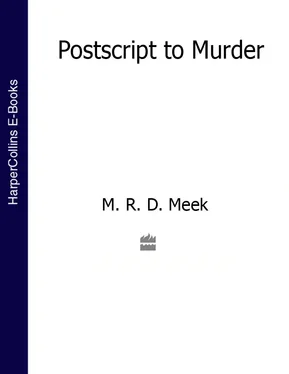‘You know we solicitors don’t prosecute nowadays, John. That’s all up to the Crown Prosecution Service …’
‘Five or six years ago you were doing it. Put a few behind bars in those days. Some got ten to twelve … With remission, they’re out now, prowling the streets, God knows what in their twisted little minds. You thought of that?’
‘I’ve not had time to think of much … Anyway, it would be your lot who finally put them away, my part was small … Why don’t they have a go at the police?’
John Upshire grinned – a rare occurrence. It split his chubby features like a half-opened bun. ‘Because, my lad, we embody the law. We’re a force to be reckoned with. They can’t point the finger at one individual in a team. But you, you’re out on your own …’
‘Which I feel most acutely,’ said Kemp, not heartened by the turn in the conversation. ‘Believe me, I’ve been searching my conscience since this morning
‘Then you’re in the wrong area. Conscience has nothing to do with it. If you’ve nailed some rogues in your time, and even a few murderers, you did it in the course of duty …’
‘And in answer to the call for justice … I know all the high-sounding words, I just wonder sometimes as to their meaning …’ Kemp felt it was probably the spirit of the grain which was beginning to fuel their terms of expression. John Upshire was normally a man of some reticence in speech, more at home with official prose than abstract concept. Only with Kemp did he sometimes relax sufficiently to reveal an inner depth of understanding, a cognisance of other issues beyond those contained in police dossiers. Kemp was surprised that he had not been made superintendent by now. The local force respected him for his fairness, the knack he had of seeing their point of view, his sympathy with raw recruits doing a difficult job in hostile circumstances, he backed them to the hilt against all criticism while at the same time upholding strict discipline, that first tenet of his belief in the system he had to operate. Perhaps the powers that be had never interpreted correctly Upshire’s inherent loyalty to the men serving under him, and his refusal to bend even when it went against the wishes of his superiors. There would have been conflict there; perhaps it had not helped him in the promotion stakes.
‘I’ll run a routine check,’ the inspector was saying, ‘to see if there’s anybody just released or out on parole who might fit the bill.’ He paused, and shook his head. ‘But it’s a long shot. Most of them steer clear of trouble – at least for a month or two. And we keep a close eye on them if they’ve been part of one of the organized-crime rackets. This kind of petty revenge isn’t nearly as common as you might think …’
‘I don’t see anything petty in an attempt on my life. It’s the only one I’ve got and I’d like to hold on to it for a while yet.’
‘I bet you do – particularly now it’s changed. You got married …’
Upshire could not keep a slight resentment from edging into his tone. He too had savoured these nights spent mulling over cases, the relationship which had brought comfort to them both when neither could find it at home. Now things would be different. Kemp had acquired a wife – and not one John Upshire would have chosen for him. Mary Blane, her name when she was single, though she had had others, had a past which the inspector considered to be dingy if not downright disreputable. He could not help commenting on it, even at the risk of putting strain on a friendship he cherished.
‘Have you thought that it could be your wife they were getting at? She had some pretty weird connections back there in the States.’
‘Come off it, John. Matrimony hasn’t quite blighted my wits. Of course I’ve wondered about that, but it just isn’t on … These letters I’ve had, what they say, they’re aimed at me alone. They hint at things that have happened only to me, either here in Newtown or even further back … I haven’t any ideas yet as to what they’re getting at but I’m working on it. But it has nothing to do with Mary.’
Upshire grunted. ‘Whatever you say … I’d better have a look at them. I suppose you’ve kept the stuff?’
‘Have you ever known a lawyer throw away anything that’s written down? And, talking of Mary, she’d like you to come to supper on Saturday night. She feels it’s time she got to know you better and, frankly, I think a closer acquaintance with her will modify your view.’
If John Upshire’s acceptance of the invitation was grudging that was only to be expected. Kemp was well aware that the inspector’s opinion of Mary Madeleine Blane, now Mrs Kemp, was bound to be coloured by her involvement in a recent case which had put her by Upshire’s reckoning in that grey area between legal right and moral wrong, or perhaps the other way round. As an upholder of the law, the inspector didn’t like grey areas; he preferred to see people in black and white, and possibly with little captions under them saying guilty or innocent. Kemp’s work, by its very nature, forced him to dig deeper into the character and motive of his clients so that his attitude to their frailties tended to be tolerant and sometimes even ambivalent.
The two men parted at the corner, Upshire to go back to the empty suburban house he and Betty had bought when he was first posted to Newtown. His daily housekeeper would have left him his supper, and be gone till the morning. He would eat it in the kitchen, lock up and go round putting out the lights, but the bedroom would be cold and unwelcoming … Kemp watched him stride off, and felt a pang. He knew that life only too well. For years he also had returned late at night to a sterile lodging, the flat above the builder’s yard he had inhabited for so long with its folk-weave curtains drawn against the dark and the drab furniture staring up at him …
All that had changed, and Kemp had sensed the undercurrent beneath the inspector’s guarded: ‘Well, if nothing comes up I’ll be round on Saturday … Seven-thirty? Right
It was inevitable that the relationship between them would never again have the old easy familiarity. Professionally they would meet as before and have the same respect for each other’s work but that other bond that had drawn them together, two men of single status in a society seemingly composed of couples, that bond was broken.
Well, it wouldn’t be the first time a friendship had foundered on the rock of a marriage … Kemp’s mind was caught up by a half-remembered jingle, something from the Chinese:
‘The single man can never know
The ins and outs of marriage …
The envy that the coachmen know
For those within the carriage.’
Despite the serious nature of the matter which had made him seek out Inspector Upshire tonight, Lennox Kemp was smiling as he went home to his wife.
CHAPTER 2
As Kemp put the key in his own front door he was reminded of another complaint by John Upshire.
‘I don’t know why you had to stick yourself in this end of town anyway … It’s too near the centre – what with that bowling alley and that so-called youth club – a lot of mindless do-gooders doing no good at all to them that’s going to the bad anyway, like rotten apples in a barrel
Upshire’s rare excursion into metaphor owed more to the quality of the malt being drunk than an attempt at humour, but again behind the words there had been resentment. ‘Why didn’t you and your new wife take a nice house in a quiet suburb instead of down there in that troublesome spot … It’s no wonder you get things put in your letterbox.’
The inspector probably guessed that it had been Mary’s choice, the large Victorian leftover in a terrace beside the station.
Читать дальше












